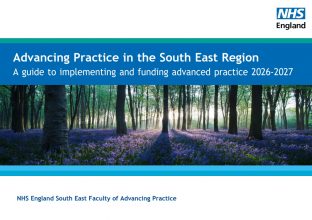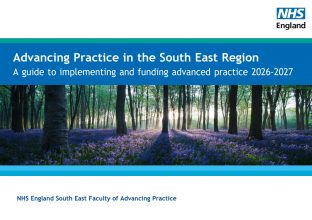NHS England South East Faculty of Advancing Practice: A guide to implementing and funding advanced practice 2026-2027
Foreward
This South East (SE) Advancing Practice guidance has been designed to support organisations in our region with their advanced practice transformation across services, to help build the advanced practice workforce of the future, ensuring a positive impact in pathways of care for our people.
Advanced practice is central to delivering the ambitions set out in the NHS Fit for the Future: 10 Year Health Plan for England, which emphasises transforming care models, improving access, and ensuring sustainability across the health system. As patient needs evolve and service pressures intensify, advanced practitioners play a pivotal role in enhancing quality and driving innovation in pathways of care.
Funding is a critical enabler of this transformation. Investment in advanced practice education and workforce development ensures the workforce are equipped with the knowledge, skills, and capabilities required to deliver integrated, person-centred care. This guide provides a clear framework for understanding funding pathways, supporting employers to make informed decisions that align with strategic priorities and workforce planning objectives.
By embedding advanced practice across settings, we strengthen multidisciplinary teams, improve patient outcomes, and create resilient services capable of meeting future challenges. This approach reflects the NHS commitment to prevention, personalised care, and efficiency principles that underpin the vision for sustainable health and care systems.
We invite our South East region stakeholders to use this guide as a practical resource to maximise funding opportunities enabling the development and sustainability of advanced practice roles. Together, we can ensure advanced practice education funding investment translates into tangible benefits for patients, professionals, and the wider system.
We want to thank all our colleagues, employers, and HEI partners who work in partnership with us. Our continued shared passion and determination will mean we are and can continue to make a difference for the people in the South East.
Sarah Goodhew
Faculty Lead, South East Region Faculty of Advancing Practice.

The South East Region Faculty of Advancing Practice team are:
|
Team Member |
Title |
|
Sarah Goodhew s.goodhew@nhs.net |
South East Region Advancing Practice Faculty Lead |
|
Karen Swift karen.swift20@nhs.net |
South East Region Advancing Practice Faculty Supervision and Assessment Lead |
|
Emmie Baker-Larner e.baker-larner@nhs.net |
South East Region Advancing Practice Faculty Project Manager |
|
Diya Kisto d.kisto@nhs.net |
South East Region Advancing Practice Faculty Project Support Officer |
Please use england.acpenquiries.se@nhs.net for all enquiries relating to advanced practice.

Advancing Practice in the South East Region
A guide to implementing and funding advanced practice 2026-2027 full download
Contents

Annual Funding Timeline
This is a summary of the timeline of key activities for the development and funding of trainee advanced practitioners by the South East Region Faculty of Advancing Practice. This is intended as a guide for employers within the region to understand the annual processes for applying for funding, where this fits in with the commissioning cycle and organisational workforce planning. It also details the scheduled key educational quality checks between the Faculty and employer.
Timeline
January
|
Process |
NHS England SE Faculty of Advancing Practice sends first communication for 26/27 funding offers to employers’ advanced practice (AP) leads. |
|
Responsible |
NHS England/Employer |
|
Activity |
Employer begins internal recruitment and selection processes for trainee advanced practitioners. |
February
|
Process |
NHS England SE Faculty of Advancing Practice send second communication for 26/27 funding offers to AP leads. |
|
Responsible |
NHS England/Employer |
|
Activity |
Employers identify ACP MSc new starters, standard and apprenticeship routes, and trainee advanced practitioners who require final year ACP PGDip to MSc top up. |
March
|
Process |
NHS England SE Faculty of Advancing Practice funding window 1-31st March 2026. |
|
Responsible |
Employer |
|
Activity |
Employer AP Lead completes Faculty online application process for named trainees identified through employer recruitment and selection process. |
April
|
Process |
Funding decisions communicated to employer by 28th April 2026. |
|
Responsible |
NHS England |
|
Activity |
Funding decisions for 26/27 communicated to employer via AP Leads by 28th April 2026. No changes to trainee names or application requests accepted after this date. |
May
|
Process |
Employer accepts funding offers and responds to funding conditions. |
|
Responsible |
Employer |
|
Activity |
Employer reviews funding decisions and responds to any conditions set by the Faculty by 11th May 2026. |
|
Process |
Funding commitment statements sent out 25th May 2026. |
|
Responsible |
NHS England |
|
Activity |
Funding commitment statements sent to trainee, supervisor, and manager to complete. Deadline for returns 31st August 2026. Successful trainees apply to HEI only once funding is confirmed. |
|
Process |
Faculty trainee AP progression quality monitoring process with AP lead. |
|
Responsible |
NHS England |
|
Activity |
Employer AP Lead and Faculty review progress of current NHS England funded trainee advanced practitioners. |
June
|
Process |
Education and training activity programme (ETAP) regional scoping process for 26/27. |
|
Responsible |
NHS England |
|
Activity |
Region begins employer scoping process for Education and Training Activity Programme (ETAP) for ACP MSc programmes for 27/28. |
August
|
Process |
Review and analysis of ETAP regional scoping. |
|
Responsible |
NHS England |
|
Activity |
Review and analysis of ETAP activity scoping for 27/28 ACP MSc programmes. Comparison with actual activity, attrition data, and workforce plans. |
|
Process |
Develop business plans for advanced practice roles. |
|
Responsible |
Employer |
|
Activity |
Organisations develop business plans for advanced practice roles, to secure organisational funding for 27/28. |
October
|
Process |
Regional Education and Training Activity Programme (ETAP) submitted. |
|
Responsible |
NHS England |
|
Activity |
Regional clinical education activity model submitted into the 27/28 Education & Training Activity Programme (ETAP). |
|
Process |
Employer undertakes 27-28 Medium Term Workforce Planning. |
|
Responsible |
Employer |
|
Activity |
Employer works with ICB and workforce planning to identify service requirement for advanced practice workforce for 27/28. Employer undertakes learning needs analysis. |
November
|
Process |
Faculty trainee AP progression quality monitoring process with AP lead. |
|
Responsible |
Employer |
|
Activity |
Employer AP Lead and Faculty review progress of current NHS England funded trainee advanced practitioners. |
December
|
Process |
AP scoping and preparation for recruitment and selection. |
|
Responsible |
Employer |
|
Activity |
Job plans and job descriptions for AP roles agreed. Employers use 27/28 ETAP scoping to inform recruitment of advanced practice trainees. |
FAQ 2026/27
These are some frequently asked questions and answers to assist organisations in the South East when developing advanced practice roles and to prepare for submitting applications for Advanced Practitioner (AP) funding in 2026/27. If you have other questions not included in this document and need an answer prior to submitting an application, please contact england.acpenquiries.se@nhs.net

Section 1 – Advanced Practitioners in the Workforce
Q1. What is an advanced practitioner?
Answer: Advanced Practice (AP) is delivered by experienced, registered health care practitioners. It is a level of practice characterised by a high degree of autonomy and complex decision making. This is underpinned by a master’s level award or equivalent that encompasses the four pillars of clinical practice, leadership and management, education, and research, with demonstration of area specific clinical competence. Advanced practitioners come from a range of professional backgrounds such as Nursing, Pharmacy and Allied Health Professionals. The Multi-professional framework for advanced clinical practice in England 2025 provides a clear and consistent approach to the development of advanced practice across England.
Q2. How do I know if I need an advanced practitioner role in my service?
Answer: For successful delivery of high-quality services that are focused on meeting person and population need, it is important that a structured workforce planning process is used to identify where advanced practice will have the greatest impact in a person’s journey through health and care pathways, and the types of advanced practice roles that may exist or need to be developed.
The advanced practice workforce should be developed and deployed in a way which meets population, and therefore service, demand.Many Workforce Planning and Modelling Tools exist, which will support you to understand the needs of your population and how to build a workforce that meets these needs. It may be helpful depending on your focus to have commissioners, HR, finance, management, and clinicians to contribute to these discussions.The NHS England (HEE) Star tool supports workforce transformation, helping providers understand their workforce requirements and providing a range of potential solutions.
Q3. How do I develop an advanced practitioner role?
Answer: The Advanced Practice Lead in your organisation should be aware of staff currently working in advanced practice roles, be able to help managers understand the need for these roles and how they may transform services. In order to establish advanced practice roles, you will need to articulate the business case for this investment, in collaboration with your AP Lead, to take into account population and system need. Job descriptions should be mapped to the Multi-Professional framework for advanced clinical practice in England 2025 and job plans should support the four pillars of advanced practice. The Centre for Advancing Practice webpage has further resources to support you with the development of advanced practice. Further resources can be found on our regional website under our tools and resources page.

Section 2 – Training an Advanced Practitioner
Q4. What commitment is expected of the trainee advanced practitioner whilst studying?
Answer: Trainees are required to attend university teaching days, practice clinical skills in their workplace and complete work-place based assessments of competencies. They will also need time to meet their supervisor regularly to plan their individual educational needs and monitor their progress. The requirements of supervisors are explained in more detail in the Workplace supervision for advanced practice 2025 – An integrated multi-professional approach for advanced practice development document and NHS England supervision resources. It is expected that each trainee will dedicate many hours to independent study to become successful in achieving the qualification. The notional number of hours of study and teaching expected is approximately 100 hours per 10 academic credits (which includes both contact hours and independent study hours) however, the actual time spent may be more, or less, dependent on individual learners. It is therefore important for trainees to have sufficient work-based learning time to develop their advanced skills.
Q5. How much time will the trainee advanced practitioner be away from their job studying?
Answer: For trainees on the apprenticeship programme, the apprentice will have off the job learning of a minimum of 6 hours per week, irrespective of the number of hours worked per week. Apprentices MUST be employed for a minimum of 30 hours per week. The Gov.UK apprenticeship funding rules can be found in more detail here. For trainees on the MSc Advanced Clinical Practice programme, employers are expected to provide trainees with sufficient study leave and protected time for work-based learning per week. The HEI (Higher Education Institute) programme lead will provide information on the total amount of study days required.
Q6. I understand advanced practice training can include Independent Prescribing (IP), what happens if I already have it, or I do not need it?
Answer: If a student already has an IP qualification or does not need it the training provider is likely to provide a choice of module(s) that the student can undertake instead and agree this with their employer.
Q7. What supervision is required?
Answer: Good supervision is a key factor for successful completion of training. Trainees who are not well supervised can struggle and some have dropped out. Each trainee advanced practitioner requires a named Co-ordinating Educational Supervisor who has completed training in multi-professional supervision and is familiar with the requirements of advanced practice. Supervisors must be willing and have protected time (in their job plan) to support the trainee. Trainees will need time to meet their supervisor regularly to plan their individual educational needs and monitor their progress. The requirements of supervisors are explained in more detail in the Workplace supervision for advanced practice 2025 – An integrated multi-professional approach for advanced practice development document, Advanced practice workplace supervision – Minimum standards for supervision (2020) document and NHS England Supervision and assessment resources and Advanced Practice Supervision – a Multi-professional Learning Resource
Q8. I have been asked to supervise a trainee advanced practitioner. How do I know if I am the right person?
Answer: Supervision is an essential element of training to be an advanced practitioner.
If you have been asked to supervise a trainee advanced practitioner, it is important to ensure you have the experience, knowledge, and expertise to provide good quality supervision. There are tools that can help you decide if you are ready to supervise your trainee or if you need further training to be able to undertake this role. The NHS England Supervisor Readiness Checklist can help you self-assess your readiness to supervise a trainee advanced practitioner.
There is also guidance on the minimum expected requirements of supervision in the NHS England Advanced practice workplace supervision, Minimum standards for Supervision document.

Section 3 – NHSE Funding
Q9. How does the NHS England demand scoping exercise inform the funding process?
Answer: NHS England scope employer intention to access the advanced clinical practice MSc in in June-August each year as part of the annual Education Training Activity Planning (ETAP) cycle.
We will ask for you to submit details of your intention/forward planning to support ongoing discussions across advancing practice, nursing, allied health professions, pharmacy, transformation and workforce planning and intelligence teams, Integrated Care Board (ICB) systems and Higher Education Institute (HEI) partners. This helps inform the funding allocation, dependent on HEI capacity.
Funding requests are required to align with and support overarching ICB and organisational workforce plans. It is expected that where individuals are receiving funding to complete an ACP MSc programme of study, they will be enabled to function at advanced level as per the NHS England Multi-professional Framework for Advanced Practice in England 2025 The funding window will open in March 2026 when the number of commissions you requested in July/August 2025 should align with your applications for funding.
Q10. I am thinking of employing a trainee advanced practitioner, what is NHS England South East’s funding offer in 26/27?
Answer: NHS England is supporting the development of advanced practice roles in 26/27 by offering a package of funding and support for advanced practice trainees. There are three potential options and employers are invited to put forward requests for funding, subject to NHS England budget constraints, under one of the following offers available.
- ACP MSc – Funding for tuition fees for a maximum period of three years for an Advanced Clinical Practice MSc. NHS England will pay the full tuition costs plus an education funding grant. The education funding grant is approximately £6000 per annum, per individual, paid directly to the employer. A minimum of £2,600 of the education funding grant (subject to annual inflation) must be made available at service level to directly support the supervision of the trainee. Some HEIs may offer an option to complete the ACP MSc over 3.5 years. NHS England offer funding for max 3 years.
- ACP Apprenticeship – National mitigation funding for the Level 7 Advanced Clinical Practice Apprenticeship programme, which has a typical length of 36 months is paid to the employer as apprenticeship mitigation funding. NHS England will provide a supervision fee of £2,600 per annum (subject to annual inflation), per individual also paid directly to the employer. This must be available at service level to directly support trainee supervision.
- ACP Top Up – Funding to enable those who have completed a PgDip in advanced clinical practice (not any other PgDip), to undertake the final modules to achieve the full MSc mapped to the multi-professional framework, usually this is the dissertation. NHS England will fund tuition costs directly to the HEI for staff that have existing academic and workplace capabilities where the employer supports them to achieve the full ACP MSc. Top-up modules from ACP PGDip to ACP MSc must be completed within the academic year.
- Funding for single modules will not be provided. Employers may use alternative NHS England or CPD funding to support standalone modules for individuals.
- ePortfolio (supported) route – the ePortfolio (supported) route has been specifically designed to enable recognition with the Centre for Advancing Practice The ePortfolio (supported) Route is designed to enable recognition of existing, experienced advanced practitioners, working in an advanced practice role, and with employer support to undertake this route.
This route is ideal for those who:
– Are currently working in advanced practice roles
– Completed their advanced practice education before 2017, or through a non-accredited programme
| Training pathway | Tuition fees | Additional funding |
|---|---|---|
| ACP MSc | Full tuition fees paid to the HEI for a period of 3 years practice | An education funding grant of approximately £6,000 per annum paid directly to the employing organisation via the education contract (EFA). (A minimum of £2,600 (subject to annual inflation) of this must be available at service level to support trainee supervision |
| ACP Apprenticeship | Apprenticeship mitigation funding paid to the employer through the education funding agreement (EFA) | £2,600 per annum (subject to annual inflation) to support trainee supervision |
| ACP Top-up modules | Tuition fees paid to the HEI for named modules agreed between NHS England and the employer. Modules must be completed within a single academic year and must enable individual to fully meet the multi-professional framework for advanced clinical practice | £2,600 (subject to annual inflation) per annum to support trainee supervision |
Q11. I am considering employing a trainee advanced practitioner, why would I choose the apprenticeship route rather than the non-apprenticeship Advanced Clinical Practice MSc programme?
Answer: To view the Apprenticeship Standard for an Advanced Clinical Practitioner, click here. Employers should ensure that individuals put on to an apprenticeship route are committed to completing the full programme.
If employers have previously utilised the apprenticeship levy, then apprenticeship mitigation funding will be available to employers via NHS England to fund this route. Additional detail to follow early in 2026 once available.
Q12. What is the education grant and what is the responsibility of the employer on receiving this?
Answer: The education training grant MUST be used to ensure the support required around the NHSE funded trainee, which enables their learning in practice.
Please read in conjunction with NHS England advanced practice training funding: conditions and guidance found in Appendix 6
Q13. What is the supervision fee and what is the responsibility of the employer on receiving this?
Answer: The supervision fee is available to support trainees on an ACP MSc pathway, enabling the employer to comply with the minimum standards of supervision.
A lack of effective supervisory support often results either in individuals withdrawing from the programme or seeking alternative employment; employers should consider whether they can fully support individuals before seeking funding for training.
The supervision fee must be allocated at service level to support individual trainee supervision. This fee is directly tied to the quality of supervision and assessment, which will be reviewed during the six-monthly bipartite quality review between NHS England SE Faculty of Advancing Practice and the AP Lead. Any concerns regarding supervision quality will be addressed regionally and may be escalated for further investigation. Persistent issues could result in withdrawal of funding.
The expectations of employers in return for the supervision fee are:
The supervision fee must not be used for equipment or capital costs. Further guidance for employers on the use of supervision funding can be found on our regional web page – Supervision Funding for Advancing Practice Training in the South East Region Guidance for Employers
At the end of each financial year, employers will be required to report on their use of the supervision fee in meeting these expectations. Where the expectations are not met, funding may be discontinued and where there is a pattern within an employer of advanced practice trainees not being supported appropriately, future funding for advanced practice may be fully withdrawn from the employer.
Q14. How and when does the education grant/ supervision fee get paid to the employer?
Answer: A data validation exercise between NHS England and the employer will take place to confirm trainee enrolment. The education grant/supervision fee will be paid as below:
- Trusts: Education funding grant/supervision fees will be paid directly to the employer via the Education Funding Agreement schedules after an individual has enrolled and started the programme, based on the validation exercise.
- Primary Care: Education funding grant/supervision fees will be paid after an individual has enrolled and started the programme, based on the validation exercise. The payment mechanism is dependent on the ICS and Training Hub you are in. Please email acpenquiries.se@nhs.net if you require more detail.
Q15. How is the supervision fee calculated for part time staff?
Answer: The apprenticeship and MSc programmes require the student to work for a minimum of 30 hours per week. All employers receive the same amount of supervision fee per learner irrespective of whether the student is working between 30 or 37.5 hours per week.
Q16. Can a trainee fund their own advanced practice programme?
Answer: The self-funding of an ACP MSc programme is not recommended for several reasons. Advanced practice roles can only have the intended impact on patient care where fully supported by employers, integrated within a strategic workforce plan, and with the oversight and robust governance required to ensure patient and practitioner safety. In addition, the availability of places on ACP MSc programmes within the region is coordinated by universities in conjunction with NHS England to meet system, employer, and service need.
Q17. What are the minimum hours the employee needs to be employed, to be a trainee advanced practitioner?
Answer: For the apprenticeship programme it is a minimum of 30 hours per week. For the MSc Advanced Clinical Practice programme, this will differ at each university but again, this will generally be a minimum of 30 hours. If the employer is recruiting a new person as a trainee advanced practitioner, then it is suggested they are recruited on a minimum contract of 30 hours. For existing employees, if they work less than 30 hours per week, please contact the relevant programme lead at the Higher Education Institute to discuss their suitability for the programme. NHSE funding for advanced practice is for employees who are working a minimum of 30 hours per week, irrespective of university requirements or ACP pathway.
Q18. Which organisations can apply for funding?
Answer: NHS organisations such as Trusts and GP Practices (via their Training Hub/Primary Care School) in the NHS England SE region are invited to submit their funding applications for advanced practice training for new learners.
Independent providers of NHS services can also be considered.
Q19. What are the conditions that need to be met to qualify for advanced practice funding?
Answer: The decision by NHS England South East Region to award funding for advanced practice is on confirmation of the following at organisation, Trust or Primary Care Hub level:
- Completion of the Readiness for Advanced Clinical Practice checklist to identify areas for development.
- An identified local population/service need for advanced practice workforce development
- Alignment to the key principles in the Health Education England Multi Professional framework for advanced clinical practice 2025 and guidance from The Centre for Advancing Practice.
- A positive learning environment with an identified, named Co-ordinating Educational Supervisor and agreed supervision plan.
- An identified lead for advanced practice within the employer.
- Regular communication with NHS England SE Advancing Practice Faculty with 6 monthly bipartite quality reviews between the Advanced Practice lead and the Faculty to assess trainee progress
- A plan to measure and evaluate the impact of this workforce transformation on service and patient outcomes.
- A named individual who has the support of the employer, has a named supervisor, and meets the academic requirements to undertake this programme of study.
To be read in conjunction with NHS England advanced practice training funding: conditions and guidance in Appendix 6
Q20. Is this funding for new or existing employees and does NHS England have a preference?
Answer: The funding offer is for both new and existing NHS staff and NHS England welcome applications for both. However, for employers who are planning to recruit a new member of staff, it is recommended financial commitment for the recruitment is obtained as soon as possible, usually via business case approval processes, and with sufficient time prior to the Higher Education Institute admissions process.
The employer should provide assurance that there will be an advanced practice post on completion of training, demonstrated in the service/division establishment by way of a job description and job plan, to avoid investing in the upskilling of staff who cannot then put their advanced skills into practice. Employers are required to submit a job description and job plan as evidence when submitting their applications for funding.
Q21. How can we ensure new trainees are ready for advanced practice?
Answer: It is essential that anyone applying to become an advanced practitioner fully understands the expectations and commitment needed to train for this role. We have developed a Readiness to become an advanced practitioner that you can use in your recruitment and selection processes to help aspiring trainees assess if they are ready to become advanced practitioners

Section 4 – NHSE Funding Application Process
Q22. How do I apply for NHS England funding?
Answer: All applications are required to be submitted via the template provided to the nominated Advanced Practice Leads only by the Faculty. Templates which are not completed fully will not be accepted.
Applications open on 1st March 2026 and the deadline for submission is 31st March 2026.
Employers must have completed a Readiness for Advanced Clinical Practice Checklist before submitting their applications.
Q23. Who should complete the application?
Answer: NHS England requires a single Advancing Practice Lead (or an individual responsible for advanced practice within an organisation) contact for each employer to submit applications for this funding. This person will act as the key liaison for all enquiries relating to the applications for funding being applied for. This is to ensure there has been appropriate scrutiny applied to the application including agreement for recruitment (where needed) and alignment with organisational workforce development needs. Applications from individuals seeking funding will not be accepted if not submitted through the Advancing Practice Lead.
Q24. What happens after I have submitted my application?
Answer: NHS England will review all applications, and the indicative demand. Funding will be confirmed where possible, depending on the allocated budget by end April 2026. It may not be possible to provide funding for all applications received and where you are not successful, you will be notified. Successful applications must be completed in full. Incomplete applications will not be accepted.
Q25. Can I make changes to the application after the closing date?
Answer: No changes to the names or details can be accepted after the window has closed and the offers have been made. This is due to the volume of applications received and the validation exercise that must happen between NHS England and the HEI.

Section 5 – HEIs and Student Support
Q26. What HEIs can individuals study at?
Answer: NHSE SE Faculty of Advancing Practice funds Centre for Advancing Practice accredited ACP MSc programmes in the SE region. Funding for accredited ACP MSc programmes that are from Higher Education Institutes outside of the SE region, where specialist programme provision is not available in region will be considered on a case-by-case basis, and require appropriate justification.
If funding is agreed by NHS England, individuals are responsible for successfully securing a place on the ACP MSc programme. Funding will then be paid from NHS England to HEIs directly via the NHS education and training contract.
Q27. Which HEI and Advanced Clinical Practice programme is the right choice?
Answer: It is particularly important for trainees and AP Leads to carefully review the content of the ACP MSc programme for the HEI requested. All the programme details can be found on each university’s website but if further information is required, contact should be made with the HEI directly. The Faculty would strongly advise a conversation with the ACP MSc programme lead. The programme requested must be checked to ensure it meets the needs of the trainee’s scope of practice and that the trainee meets the HEI’s entry criteria.
An offer of funding from NHS England does not guarantee a place at the selected HEI. If a candidate fails to secure a place at their chosen HEI, the funding offer will be withdrawn. Similarly, if the individual applies to a different university from the one agreed, funding will be withdrawn.
Requests to change the HEI after funding applications have been submitted will not be accepted and any offer of funding will be withdrawn.
Q28. Can a trainee apply for recognition of prior learning (RPL)
Answer: Individual practitioners can RPL a maximum of 2 level 7 modules of any credit value into their ACP MSc programme. This must be declared on the funding application to NHSE with details of the modules. It MUST be agreed at the point of application to the HEI and is at the discretion of the HEI programme lead. Any costs for RPL must be met by the individual or the employer. Individuals wishing to RPL more than 2 modules into their programme will not meet the criteria for NHSE funding. These trainees must find funding from alternative sources such as CPD funding from their employer.
Q29 What is an NHS England Centre of Advancing Practice accredited ACP MSc course?
Answer: To become Centre accredited, programmes meet standards set out in the Multi-professional Framework for Advanced Practice in England 2025 and Programme Accreditation Resources set by NHS England so they consistently meet the standards, put patients at the heart of what we do, and deliver a high quality academic and clinical programme.
NHS England accredited programmes are one of the benchmark routes to recognition for practitioners and ensures a consistent level of quality across England.
To find out if the programme you wish to complete has been accredited you should look for the Centre benchmark on the HEI prospectus or search the Centre for Advancing Practice Accredited Programmes.
Q30. What are the HEI’s admission requirements for a trainee advanced practitioner?
Answer: Basic entry requirements for HEI courses can be found on their websites.
The Advancing Practice Lead must check that the trainee meets the entry criteria before submitting an application for funding. Special consideration may need to be given for candidates who have qualifications from overseas. These candidates should check in advance that their qualifications meet the entry criteria for the HEI. The Advanced clinical practitioner (integrated degree) for an Advanced Clinical Practitioner outlines the entry qualifications. Eligibility and right to work criteria for apprenticeships can be found here.
Any questions about HEI entry requirements, course content, their application process, or individual modules should be referred directly to the HEI.
Q31. How is an application made for the HEI programme?
Answer: Once a funding offer has been made and all required documentation completed, the trainee must submit an application to the agreed HEI. This should be actioned as soon as the above processes are completed. This is usually by the end of May after the funding window closes.
Q32. What support can trainee advanced practitioners expect during their studying?
Answer: All HEI programmes will be taught by lecturers and expert clinical practitioners in their field who will offer dedicated academic support and guidance, and students will be allocated a named personal tutor. The HEI may also offer support through a dedicated librarian and a comprehensive student support service. Students also find their cohort of colleagues of immeasurable value as a support network. In the case of failing students, the matter would be discussed with the student in the first instance.
The NHS England SE Faculty Trainee in need of support guides trainees and employers where to find support.
Q33. What happens if the trainee discontinues their ACP MSc programme before it is completed?
Answer: It is recognised, from time to time, some trainees may have to suspend their study e.g., for long term sickness, personal reasons etc. Where a trainee is discontinuing their studying but will be returning to complete this, and have indicated the timescales to the HEI, this is called ‘stepping
off’ and NHS England will consider resuming funding when the student returns to study. However, these are reviewed on a case-by-case basis as it is dependent on whether the student is able to complete the course within the timescales available on their return. A proactive conversation with the Faculty team is advised in advance of a decision being made.
Where a student is not returning to study, NHS England will discontinue the funding at the point they leave the programme. NHS England must be informed using the change of circumstances process as soon as possible by contacting england.acpenquiries.se@nhs.net
Q34. What happens if the trainee advanced practitioner leaves the employer that NHS England is currently funding for another employer?
Answer: This will be reviewed on an individual case-by-case basis, and no guarantee of continued funding can be provided to either the employer or employee. The funding is linked to a workforce need, not an individual’s personal development and so if the trainee moves from the original place of employment funding may stop. A proactive conversation with the Faculty team is advised in advance of a decision being made.
NHS England must be informed using the change of circumstances process as soon as possible by contacting england.acpenquiries.se@nhs.net

Advancing Practice in the South East Region
A guide to implementing and funding advanced practice 2026-2027 full download





